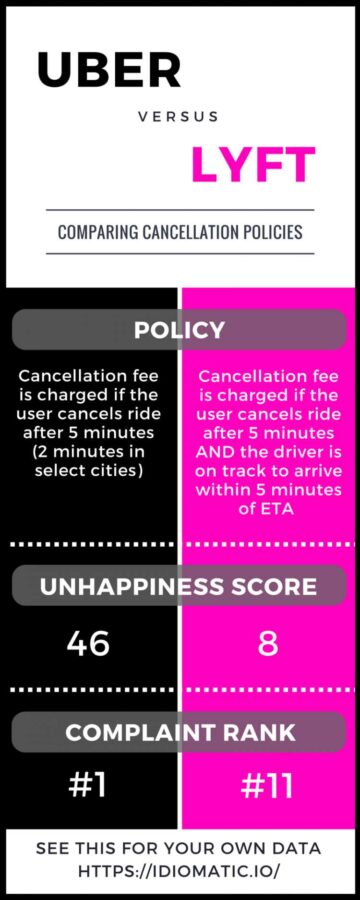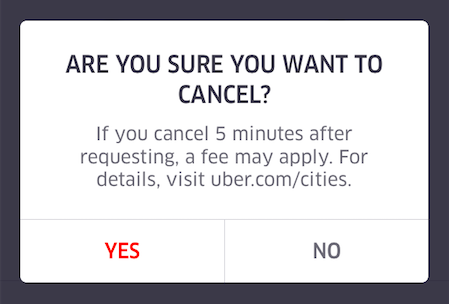My wife and I recently took a red-eye flight into Boston for our college reunion. We landed at 6am and were exhausted, so I decided to call an Uber rather than taking the subway.
Six minutes later, my phone buzzed and informed me that our Uber had arrived, but the promised red Prius was nowhere in sight. So, I called the driver, and found out that he was on the departures level whereas we were upstairs at arrivals (as specified by the app). The driver said that he’d circle around and come get us. 10 minutes went by and still no Prius, so I checked the app and saw that the driver had left the airport altogether and was halfway to downtown Boston. I called the driver again, who assured us that he was coming back, but the app clearly showed that he was continuing to speed away from the airport.
At this point, a reasonable person would have cancelled the ride to find an alternative. Had I done that, I would have been hit with a cancellation fee, because Uber’s policy is to charge $5 if a rider cancels a ride after 5 minutes (2 minutes in some cities).
It turns out that experiences like these are quite common, to such an extent that unfair cancellation fees are now the #1 source of Uber rider unhappiness. Idiomatic’s belief is that if businesses want to win in a competitive market, they should prioritize solving their customers’ top pain points. So, we’re going to propose a solution for Uber backed by real customer feedback.
Some customer pain points are easier to address than others. The more difficult pain points are those that are existential to the business’ core offering (e.g., on-time delivery for UPS or food safety for Chipotle). These are battles that the companies have to fight every day, and are difficult to solve permanently. The easier pain points are those that are caused by a service, product, or policy decision that can be changed. Cancellation fees for Uber fall into the latter category.
One way to identify whether a customer pain point is existential is to see if it’s a top customer pain point for all companies in the industry. If it is, the pain point is more likely to be existential. If it isn’t, then the pain point is clearly solvable since another company has done so. In the US, Uber’s main rival is Lyft, so Idiomatic analyzed Lyft’s app reviews as well to see how big a problem cancellation fees are, and the results are revealing.

From this comparison, it’s clear that cancellation fees do not have to be Uber’s top complaint, since it doesn’t even crack the top 10 for Lyft. Furthermore, if we compare the actual cancellation fee policies for the two companies, they’re extremely similar except that Lyft will only charge you the cancellation fee if the driver is on-track to arrive within 5 minutes of the estimated pick-up time. What this suggests is that whoever was in charge of making Lyft’s cancellation policy realized that riders should not be penalized if the driver does not pick them up in a timely manner, and wrote their cancellation policy accordingly. And as a result of that decision, Lyft’s cancellation fees cause less than one-fifth of the unhappiness of Uber’s cancellation fees.
To add an additional wrinkle to this, Uber’s support organization already knows that cancellations are not always the rider’s fault. In the same reviews that complain about the cancellation fee, several Uber riders reported that after they filed a complaint with Uber, customer support responded within 5 minutes and refunded the fee. This suggests that Uber customer support has a standing policy of refunding cancellation fees when it seems that the driver was at fault – a policy Lyft has already embedded in their app.
Bottom line, it seems clear that if Uber cares about rider happiness, they should follow Lyft’s lead in this instance and just programmatically not charge cancellation fees when the pick-up is significantly delayed. Otherwise, they’re just adding insult to injury by penalizing riders who have already been waiting longer than expected. Given how less angry Lyft riders get about Lyft’s cancellation fee policy, we can infer that most customers who complain about Uber’s cancellation fees do so because they felt that they were not at fault.
This is not to say that Lyft doesn’t have anything to learn from Uber. After all, Bloomberg reported that in March 2016, U.S. riders booked 50 million rides through Uber, compared to 11 million rides through Lyft. We’ll dissect opportunities for Lyft in a future analysis.
This is the second in a series of posts in which Idiomatic analyzes customer feedback using our platform and uses those insights to suggest ways of making popular products or services even more magical. If you enjoyed reading this, click the “follow” button to the right to be notified when we release new content. Or, if you want to see what Uber’s app review data looks like in the Idiomatic dashboard, click here for a login.




